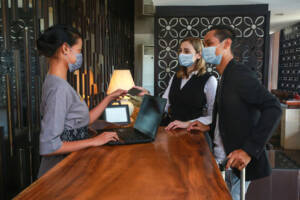
In a matter of months, the coronavirus has blazed its path around the globe, closing our schools and shuttering many businesses. But in the face of national and international lockdowns, few industries have been as affected as hospitality.
Nevertheless, as it has always done, the industry is rising to the challenge. Hospitality professionals are finding new and innovative ways to safely serve guests, protect workers and their communities, and provide exceptional customer care.
Service innovation
One of the most important ways that the hospitality industry is responding to COVID-19 is by rethinking operating strategies. These strategies incorporate the Centers for Disease Control’s (CDC) recommended best practices into daily processes to create safer workspaces and service protocols for employees and guests.
A perfect example of this is Indiana’s Hoosier Hospitality Promise. Crafted through a collaboration among state health officials, the Indiana Tourism Association and the Indiana Restaurant & Lodging Association, the Promise provides a series of guidelines that businesses in all hospitality sectors can use to continue to operate while maintaining vigorous sanitation, hygiene and social distancing standards. Participation in The Promise also helps reassure customers that they will be safe in patronizing hospitality businesses.
Going digital
In addition to adopting state and federal guidelines and the recommendations of public health experts in on-site operations, hotels are also increasingly going digital. Today’s digital technologies are helping to fully automate hotel operations and limit or eliminate face-to-face contact. This ranges from permitting online guest check-ins to receiving guest service requests through phone and text messages.
Digital technologies are also assisting hoteliers in maintaining relationships with established and prospective clients through social media. This includes using social media to facilitate crisis communications. Hoteliers can use various platforms to update guests on measures they’re taking to protect guest and worker safety, solicit guest questions and feedback to facilitate market responsiveness, and promote special services and offerings in response to guests’ evolving needs.
For example, hoteliers can promote special “staycation” packages using social media to target local families who are craving a vacation but aren’t yet ready for air travel or a long road trip.
Setting the stage
No question about it, the guest is the heart and soul of the hotel industry. But while guests may be the purpose, it’s the workers who make it … work.
And let’s face it, we’re all feeling a little apprehensive right now. Employees are going to require a bit of extra attention and some careful nurturing to help them through this challenging time.
As with guests, hospitality staff needs to be routinely updated on the measures being taken to protect them and their families. And if you’re one of the many businesses that has had to reduce its operating hours or shutter your doors completely for a while, it’s important to reach out to your staff. They are likely feeling the financial effects of these shutdowns particularly acutely. However, there are resources to help hospitality workers with their financial needs, such as local fundraisers and charitable institutions.
In addition to clear, consistent and comprehensive communication, they’re also going to need to set up workspaces that are not only safer but also reassuring to staff and customers alike. That includes revamping workspace layout to facilitate social distancing. It may even include bringing in new furnishings that provide safety barriers between workers and enable distancing from guests and colleagues.
At the same time, revised workspaces need to support workers’ mental and emotional health, as well as their physical well-being. It’s important to choose surfaces and finishes that are easy to clean and sanitize. Augmenting them with warm and inviting touches can make staff feel safe and soothed. Everything from choice of color palette to lighting can be used to create a workspace that feels at once productive and protective.
Those with a hotel grounds permit might even install a garden on-site and enlist employees in caring for the plants. Studies show that tending plants can have significant mental health benefits, helping to decrease stress and anxiety, and boost mood and optimism – all things we could use a lot more of right now!
The takeaway
The COVID-19 pandemic may be one of the most significant crises the hospitality industry has confronted in recent years. But, as ever, the industry is rising to the challenge – both for the sake of clients and employees. Businesses are revamping operating processes to meet and exceed the most rigorous of public health guidelines. They’re marshaling the enormous power of technology to provide exceptional contactless service while maintaining and growing relationships with our customers. And they’re creating workspaces that support the physical, emotional and mental health of amazing workers.
Beau Peters is a freelance writer from the Pacific Northwest with a passion for purpose-driven business content.


